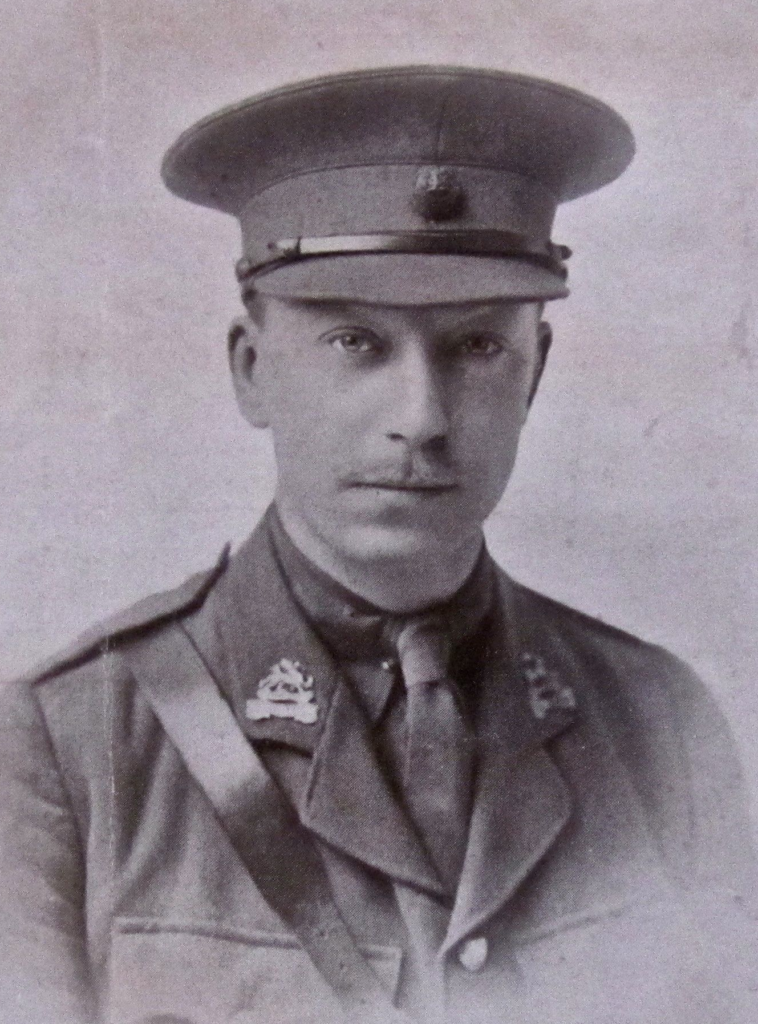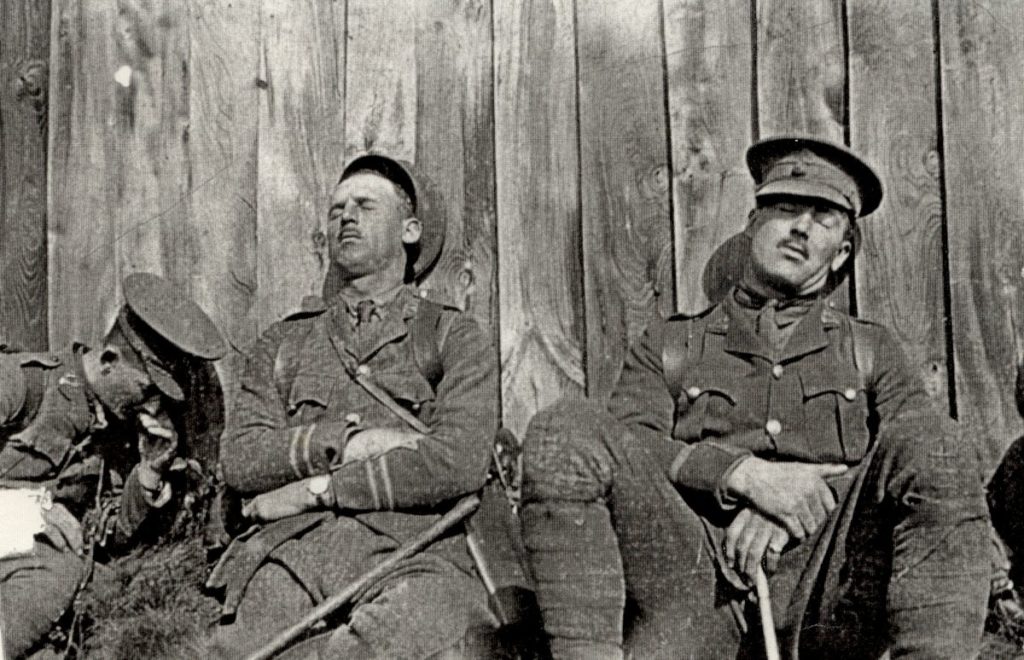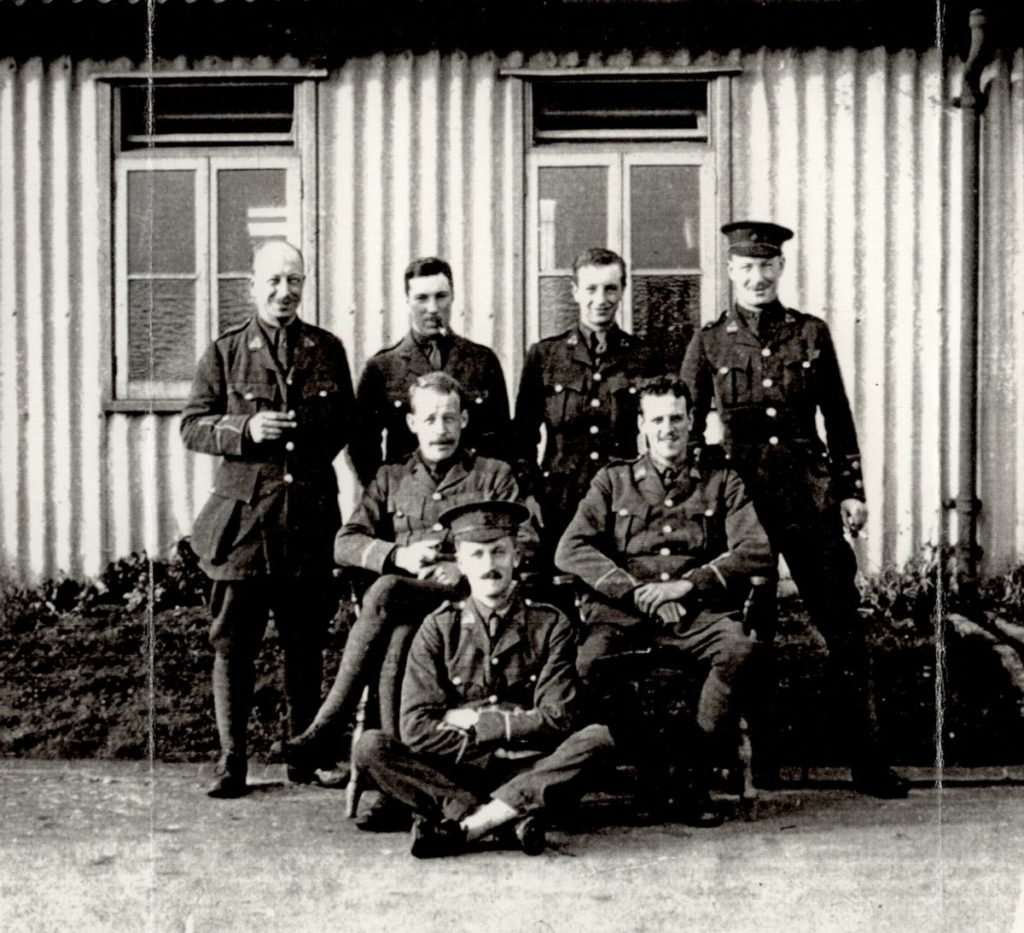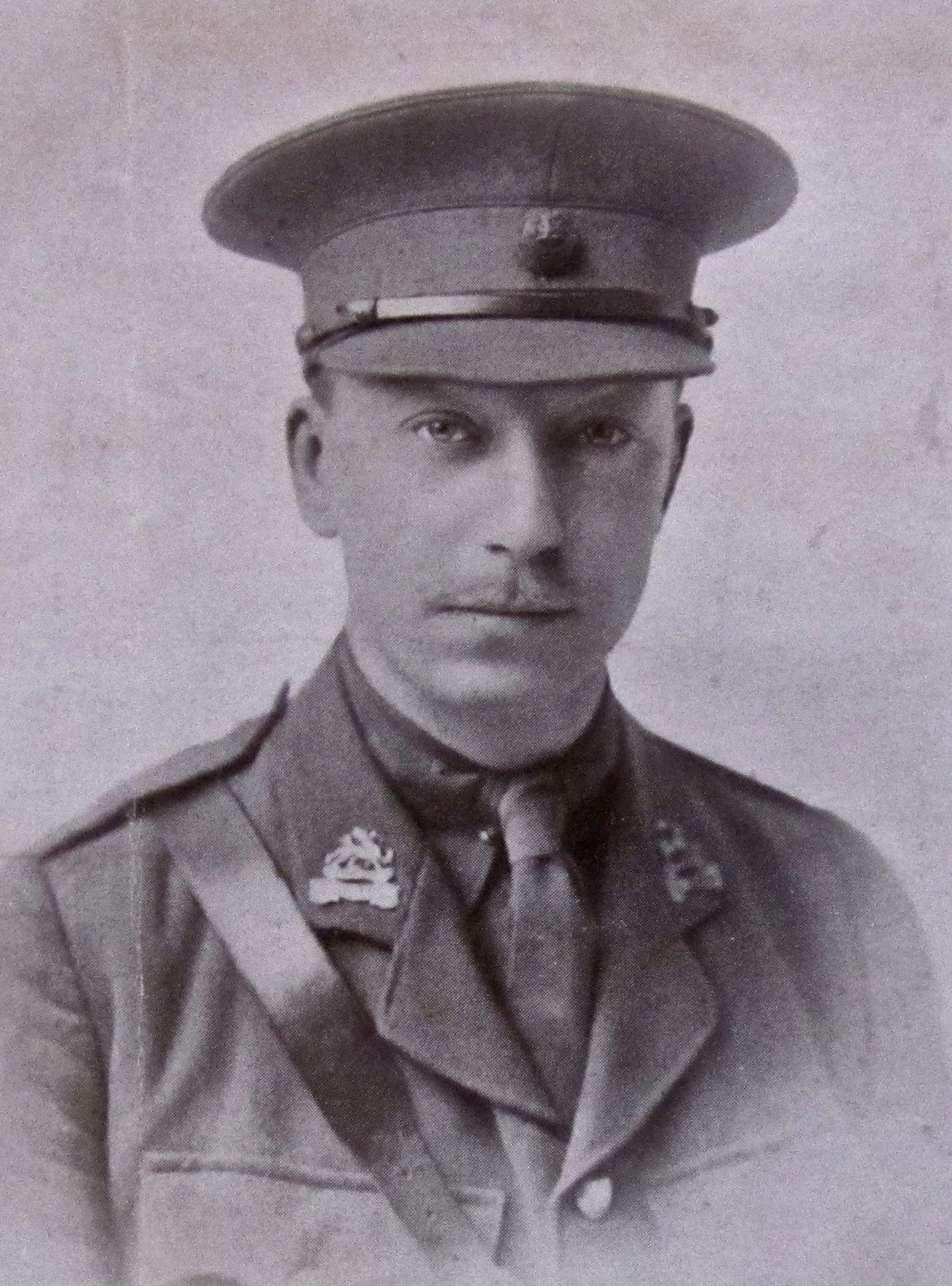Fact file:
Matriculated: 1906
Born: 3 June 1887
Died: 3 July 1916
Regiment: Royal Berkshire Regiment
Grave/Memorial: Aveluy Communal Cemetery (Extension): H.38
Family background
b. 3 June 1887 as the elder son (two boys only) of Alfred (Argo) Gilbey Gold (1859–1939) and Mary Ann Gold (née Oxenham) (1871–1926) (m. 1886). At the time of the 1891 Census the family lived at Holly Lodge, Cookham, Berkshire (six servants), and by the time of the 1901 Census it had moved to Hazlebank, Cookham, Berkshire (eight servants). It subsequently lived at 31, Gloucester Square, Hyde Park, London W2, and Bray Lawn, Bray, Berkshire.
Parents and antecedents
There was a lot of intermarriage between the Gold and Gilbey families, both of which were in the wine trade, and in 1858 Gold’s paternal grandfather, Henry Gold, JP, DL (c.1835–1900), a wine merchant who eventually settled in Cookham, married Charlotte Anne Gilbey (1836–1901), the eleventh child of Henry Gilbey (1789–1842). Walter Gilbey (1831–1914) and Alfred Gilbey (1833–79), Henry’s ninth and tenth children, were Charlotte Anne’s slightly older brothers. In 1857, after they had been discharged from the Army in which they had served during the Crimean War as civilian clerks, Walter and Alfred, encouraged by their older brother Henry Parry Gilbey (1824–92), who was a partner in a wholesale wine merchant’s, founded the London-based wine-importing (and, from 1879, distilling) firm of W. & A. Gilbey.
Gold’s father, Alfred (Argo) Gilbey Gold, was born in Dublin but, like his father, finally settled in Cookham, and he became a Director of W. & A. Gilbey.
Gold’s mother was the daughter of a farmer.
Henry and Charlotte’s youngest son, i.e. Gold’s uncle, was the oarsman and solicitor Harcourt Gilbey Gold (see G.S. Maclagan).
Siblings and their families
Brother of:
(1) Patrick Hugh (1889–1976); married first (1918) Lottie Maud Watts, marriage dissolved in 1921; second (1926) Agnes Bisset Crow (1903–1991), three daughters, one son;
(2) Alec Henry Gold (1895–1982); married (1922) Nancye Graham Wright (1897–1985), three daughters, one son.
During World War One, Patrick Hugh served as a Lieutenant with the 5th (Service) Battalion of the Royal Berkshire Regiment; he was wounded in about September 1915.
Alec Henry served in France and Egypt – also with the 5th (Service) Battalion of the Royal Berkshire Regiment – from 1915 to 1919 and was also wounded. He became a wine merchant after the war.
Education and professional life
Gold attended The Evelyns School, Colham Green, Hillingdon, Uxbridge, Middlesex (1872–1931), from c.1894 to 1900 (cf. R.A. Perssé, R.P. Stanhope, E.G. Worsley, F.W.T. Clerke, T.G. Rawstorne, J.F. Worsley). The Headmaster of the school was Godfrey Thomas Worsley (1842–1920). From 1900 to 1906 he attended Eton College, where he became a member of Pop and the 6th Form. He was also in the First Cricket XI in 1905 and 1906, and the Field XI in 1905. He was a Member of the MCC from 1907 and a keen golfer too, and his obituarist in Bailey’s Magazine called him a “gallant young sportsman” and a “fine all-round athlete, and a scratch player at golf”. Gold passed Responsions in September 1906 and on 16 October 1906 matriculated as a Commoner at Magdalen, where he played cricket and golf, and rowed for the College. In 1907 he rowed in the 1st Torpids, which started in second position on Day 1, went Head of the River on Day 2, but was bumped back to second position on Day 3. In 1908 he rowed in the 1st Torpids, which started in second position on Day 1 but then was bumped three times. In October 1907 he rowed in the College’s third coxless IV and in November 1907 he rowed in the Freshmen’s IV, when Magdalen won.
Gold took the First Public Examination in the Hilary and Trinity Terms of 1907 and was awarded a 3rd in Modern History (Honours) in Trinity Term 1909. Together with M.M. Cudmore, A.G. Kirby and J.R. Somers-Smith, he took his BA 6 November 1909. He passed the intermediate examination of the Law Society in February 1911 and the final examination in November 1912, after which he became a solicitor in the firm of Chester, Browne and Griffiths. He was Secretary of the Golf Club at Frinton-on-Sea, Essex, where he played at least once against his Uncle Harcourt (see above). He was especially close to his “great friend” Somers-Smith, acted as his best man, and became his son’s godfather. After his death, a legal friend, George Elliott, KC (1860–1916), wrote to his family:
I like to picture him as I admired him most – on the links, in all the pride of strength and skill, the very type of robust and athletic manhood, yet so diffident of his own prowess, so thoughtful and considerate for others less gifted than himself, so anxious that his own achievements should not appear to minimize the efforts of others.
His obituarist in Bailey’s Magazine was of a similar opinion and wrote that Gold was “possessed of a most lovable, genial and unselfish disposition” and “always ready to give a helping hand to others; he was beloved by all who knew him in business, in sport and with the Colours; he was greatly gifted and promised to rise high in his profession.”

Cecil Argo Gold, BA
(Photo courtesy of Magdalen College, Oxford) “Gold and his CO had advanced shortly after the Bn’s last wave had gone forward, but when the CO saw that the attack was failing, he withdrew as many of his men as possible and told them to dig in along the Albert–Ovillers sunken road, facing south. 80–100 men held this position for the entire day and it was here that Gold was kia, aged 29, after being shot through the head by a sniper, just behind the CO.”
Military and war service
On 16 June 1906 Gold was commissioned Second Lieutenant in the 1st (Buckinghamshire) Battalion, Buckinghamshire Volunteer Rifle Corps. On 11 November 1914 he applied for a Temporary (Regular) commission and was transferred to the 5th (Service) Battalion, Princess Charlotte of Wales’s (Royal Berkshire Regiment), the Battalion in which his two younger brothers were also serving.
The 5th Battalion was formed at Reading on 25 August 1914 and trained in southern England until 31 May 1915, when it landed at Boulogne as part of 35th Brigade, 12th (Eastern) Division, with Gold, now promoted Lieutenant, as its Adjutant (London Gazette, no. 29,569, 5 May 1916, p. 4,458). It then moved north-eastwards to Armentières where it was in billets from 7 to 14 June, got its first experience of the front area in Ploegsteert Wood from 14 to 20 June, was in divisional reserve at Armentières from 20 June to 4 July, spent another week in Ploegsteert Wood, and then took over a stretch of trenches for the first time from 10 to 17 July, losing two men killed and 15 wounded.

Three officers of the 5th (Service) Battalion, the Royal Berkshire Regiment, while resting during training in England before going to France in May 1915. Left to right: an unknown officer, Lieutenants Cecil Argo Gold and Patrick Gold.
(Photo courtesy of the Curator of The Wardrobe, the Rifles (Berkshire and Wiltshire) Museum, 58, The Close, Salisbury, Wiltshire)
The Battalion was in and out of the same trenches from 23 July to 27 September and then dispatched southwards via Merris, arriving at Loos on 30 September, just after the first phase of the Battle of Loos had finished. Here it occupied support trenches, where it was shelled by the enemy, 1,200 yards north of Loos, 2,700 yards north-west of Hill 70 (see H.H. Smith and G.B. Gilroy), and 2,000 yards south-west of Hulluch. The Battalion was relieved on 5 October and rested in billets at Noyelles from 6 to 12 October, and then went back to the trenches, where it was involved in a brief action on 13 October that cost it ten officers and 149 other ranks killed, wounded and missing. From 19 October 1915 to 3 April 1916, the Battalion rotated between the trenches and billets in three general areas: Vermelles/Noyelles/Béthune/Sailly- Labourse/Fouguereuil; Thiennes/Bellerive/Essars/Le Quesnoy/Givenchy; and Lillers/Fontes/Therouanne/Cottes. From 16 April until 30 June 1916 the Battalion trained hard for the coming battle, mainly in the Vermelles area, and during this time Gold was mentioned in dispatches “for gallant and distinguished conduct in the field” (London Gazette, no. 29,623, 13 June 1916, p. 5,917). On 30 June it moved to Franvillers, and thence to Henencourt Wood (2 July) and Albert (3 July), by which time Gold was Acting Adjutant and greatly appreciated as such (see below) by his Commanding Officer (CO), Lieutenant-Colonel Frank G. Willan (1878–1957; later Temporary Brigadier, DSO: London Gazette, no. 29,890, 2 January 1917, p. 191).
At 03.15 hours on 3 July 1916, i.e. just before it got light, the 12th Division, with Gold’s Battalion on its right flank, set off eastwards in the dark as part of the divisional attack on the fortified village of Ovillers-la-Boisselle, situated just to the north of the north-east/south-west Albert-Bapaume road. But the enemy dug-outs had not been significantly damaged by the hour-long British artillery bombardment that had preceded the attack, and by 09.00 hours the Germans had brought it to a halt, compelling the Division to report a total failure at the cost of 2,400 casualties killed, wounded and missing. Shortly after the Battalion’s last wave, Gold went forward with Colonel Willan and his orderly to inspect the German trenches, but when Colonel Willan saw that the attack was failing, he withdrew as many of his men as possible and told them to dig in between the lines along the Albert–Ovillers sunken road, facing south. 80–100 men held this position for the entire day and it was here, during the morning, that Gold was killed in action, aged 29, when he was hit in the head by a sniper’s bullet while he was standing just behind his CO; the orderly, too, was killed in action.
Gold’s body was left there, but two nights later his best friend, Lieutenant Richard Harold Causton (1879–1939), who became a Staff Officer at the headquarters of 35th Brigade and survived the war, only to suffer a serious breakdown after the Armistice, recovered it at night from no-man’s-land. He also made sure that it was given a proper burial at 06.00 hours on 6 July in nearby Aveluy, just north of Albert. When the remnants of the Battalion withdrew to Albert for the night they numbered 70 men, and although another 60 made their way back later, the Battalion’s total casualties for the day were 14 officers and 318 other ranks killed, wounded and missing. In a letter to Gold’s father, Colonel Willan described Gold as “a splendid soldier”, adding: “I cannot tell you what a blow his death was to us all and how much we shall miss him. He was a splendid example as an officer, keen, hard-working, and always had the Battalion’s comfort and welfare in his mind. I never saw him depressed, and his unselfishness knew no bounds. As an Adjutant he was splendid and cannot be replaced, and we shall all miss him very much, I know.” Gold’s body was immediately taken to Aveluy Communal Cemetery (Extension I), and Colonel Willan arranged for a cross to be erected there. He is buried in Grave H.38, with the inscription “At thy right hand there are pleasures for evermore” (Psalm 16:11). He is commemorated in St Lawrence’s Church, Bovingdon. He left £8,754 8s.

A group of officers of the 5th (Service) Battalion, the Royal Berkshire Regiment, at Shorncliffe, Kent, during training before going to France in May 1915. Left to right standing: Lieutenants Cecil Argo Gold, Roger Thompson Pollard, Alec Gold, Patrick Gold. Sitting at the front: Captain (and Adjutant) Thomas Heylyn Hudson. Hudson and Pollard were killed in action at Loos on 13 October 1915; Pollard has no known grave.
(Photo courtesy of the Curator of The Wardrobe, the Rifles (Berkshire and Wiltshire) Museum, 58, The Close, Salisbury, Wiltshire)
Bibliography
For the books and archives referred to here in short form, refer to the Slow Dusk Bibliography and Archival Sources.
Printed sources:
Obituary in the Daily Telegraph between 3 and 30 July 1916.
[Anon.], ‘Roll of Honour’ [obituary], Bailey’s Magazine of Sports and Pastimes, 106, no. 678 (August 1916), pp. 88–9.
Alec Gold (ed.), Wines and Spirits of the World (London: Virtue & Co. Ltd, 1968).
Leinster-Mackay (1984), p. 52.
McCarthy (1998), pp. 35–6.
Archival sources:
MCA: PR32/C/3/533–534 (President Warren’s War-Time Correspondence, Letters relating to H.G. Gold [1916]).
MCA: 04/A1/1 & 2 (MCBC, Secretary’s Notebook 1907 and 1908), unpaginated.
MCA: Ms. 876 (III), vol. 1.
OUA: UR 2/1/59.
WO95/1850.
WO339/2301.
